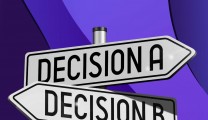So how does decision fatigue affect your life?
This occurrence can impact all of your daily activities, from meals to meetings. If your brain has to evaluate and make too many decisions, it will likely abstain from making one at all, clouding your judgment and forcing you to rely on your impulses. Impulse purchases can hurt your bank account and even lead to additional negative consequences down the road.
Say you’re looking to buy a house during the busiest time at work. Every day you have to make hundreds of important decisions for you and your company, so you’re already mentally drained when it comes time to house shopping. Because of this it’s highly probable that you’ll defer to heuristics, or mental shortcuts and impulses to make decisions regarding your house. It goes without saying what could happen if you’re not careful with home ownership.

Decisions are an inevitable part of everyday life — they’re inescapable and necessary. However, there are ways you can lessen the mental burden of your daily choices. Reducing the emotional tax of too many decisions is crucial as it will improve your productivity and creativity at work. So what can we do to avoid decision fatigue? Here are a few tips:
#1 Way to Avoid Decision Fatigue: Make Fewer Decisions
Believe it or not, there are several aspects of your personal and professional life that you can make easier for yourself. Setting up autopay for bills and delegating less important decisions at work are just a couple of examples of how you can eliminate several choices each day.
#2 Way to Avoid Decision Fatigue: Establish A Daily Routine
Implementing a strict daily schedule will keep your mind and body in rhythm throughout the day and week. It also easily takes away dozens of decisions, such as what time to wake up, what to eat for breakfast, when to exercise, and what time to go to sleep. Soon you’ll follow your daily routine on autopilot, saving mental energy for more important aspects of your day.

#3 Way to Avoid Decision Fatigue: Tackle Big Decisions First
Whether you think of yourself as a morning or evening person, it’s proven that people make their best decisions early in the day and their worst ones at night. The morning is the best time to take on hefty decisions or difficult tasks because it’s when we have the most brain power. Rational decision-making has an inverse relationship with the day, so you should go through your to-do list accordingly.












Replies to This Discussion